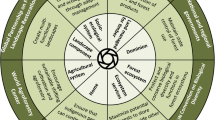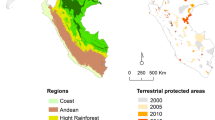Abstract
This essay critically examines the emerging view among some ethnologists that replicable models of sustainable management of tropical forests may be found within the knowledge systems of contemporary indigenous peoples. As idealized epistemological types, several characteristics distinguishing “indigenous” from “modern” knowledge systems are described. Two culturally distinctive land use systems in Latin America are compared, one developed by an indigenous group, the Huastec Maya, and the other characteristic of colonist farms in Rondonia, Brazil. While each of these systems reflects a different cultural-historical tradition, I argue that the process of knowledge formation and cultural adaptation is coevolutionary and continuous in both cases. The very concept of “indigenous” as a discrete analytic category is questioned; indigenicity alone cannot explain local adaptation of farming systems. Rather than dichotomize indigenous and colonist knowledge as inherently different categories, differences in land use patterns between such social groups may be more accurately viewed as reflecting different points on a single epistemological continuum.
Similar content being viewed by others
References
Alcorn, Janis B. 1984.Huastec Mayan Ethnobotany. Austin: University of Texas Press.
—— 1989. “An economic analysis of huastec mayan forest management.” In John O. Browder (ed.),Fragile Lands of Latin American: Strategies for Sustainable Development. Boulder CO: Westview Press, pp. 182–208.
Amanor, Kojo Sebastian. 1991. “Managing the fallow: weeding technology and environmental knowledge in the Krobo District of Ghana.”Agriculture and Human Values 8 (1–2): 5–13.
Anderson, Anthony B. (ed.). 1990.Alternatives to Deforestation: Steps Toward Sustainable Use of the Amazon Rain Forest. New York: Columbia University Press.
Balée, William. 1989. “The culture of Amazonian forests.” In D. A. Posey and W. Balée (eds.),Resource Management in Amazonia: Indigenous and Folk Strategies. Advances in Economic Botany, vol. 7: 1–22.
Barbour, Ian G. 1974.Myths, Models and Paradigms: The Nature of Scientific and Religious Language. London: SCM Press, Ltd.
Barnes, Barry and David Bloor. 1982. “Relativism, Rationalism and the Sociology of Knowledge.” InMartin Hollis andSteven Lukes (eds.)Rationality and Relativism. Cambridge: M. I. T. Press.
Berman, Morris. 1984.The Reenchantment of the World. New York: Bantam.
Bower, Bruce. 1989. “A world that never existed.”Science News 135(17, April 29): 264–266.
Browder, John O. (ed.) 1989.Fragile Lands of Latin America: Strategies for Sustainable Development. Boulder, CO: Westview Press.
Burger, Julian. 1990.First Peoples. London: Robertson McCarta.
Chambers, Robert. 1983.Rural Development: Putting the Last First. Harlow: Longman.
COICA (Coordinadora de las Organizaciones Indígenas de la Cuenca Amazónica). n. d. Our agenda for the bilateral and multilateral funders of amazon development. Unpublished document. New Orleans: COICA.
Counsell, Simon and Tim Rice (eds.). 1992.The Rainforest Harvest: Sustainable Strategies for Saving the Tropical Forests. London: Friends of the Earth Trust, Ltd.
Diamond, Jared. 1992.The Third Chimpanzee: The Evolution and Future of the Human Animal. New York: Harper Perennial.
Ereira, Alan. 1990.The Heart of the World. London: Jonathan Cape, Ltd.
Fearnside, Philip M. 1987. “The causes of deforestation in the Brazilian Amazon.” In R. F. Dickenson (ed.)The Geophysiology of Amazonia: Vegetation and Climate Interactions. New York: John Wiley & Sons, pp. 37–53.
Fee, Elizabeth. 1986. “Critiques of modern science: the relationship of feminism to other radical epistemologies.” In R. Blier (ed.),Feminist Approaches to Science. New York: Pergamon Press, pp. 43–56.
Field, Les. 1991. “Tools for indigenous agricultural development in Latin America: an anthropologist's perspective.”Agriculture and Human Values 8 (1–2): 85–92.
Frechione, John. 1990. “Supervillage formation in the amazonian terra firme: the case of Asenona.”Ethnology 29 (2): 117–133.
Gliessman, Stephen R. n. d. Local resource use systems in the tropics: taking pressure off the forests. Unpublished manuscript. Santa Cruz, CA: Agroecology Program, University of California.
Goldman, Abe. 1991. “Tradition and change in postharvest pest management in Kenya”Agriculture and Human Values 8 (1–2): 99–113.
Gomez-Pompa, Arturo, Jose Salvador Flores and Victoria Sosa. 1987. “The ‘pet kot’: a man-made tropical forest of the maya.”Interciencia 12 (1, Jan–Feb): 10–15.
Goodland, Robert (ed.). 1990.Race to Save the Tropics: Ecology and Economics for a Sustainable Future. Washington, DC: Island Press.
Gradwohl, Judith and Russell Greenberg. 1988.Saving the Tropical Forests. London: Earthscan Press.
Gross, Daniel R. 1985. “Amazonia and the progress of ethnology.”Latin American Research Review 20 (2): 200–222.
Hardison, Jr. O. B. 1989.Disappearing Through the Skylight: Culture and Technology in the Twentieth Century. New York: Penguin Books.
Harman, Willis. 1988.Global Mind Change. New York: Warner Books.
Harp, William. 1991. Ecology and cosmology, rain forest exploitation among the Emberá-Chocó. Unpublished paper presented at the Humid Tropical Lowlands Conference: Development Strategies and Natural Resource Management, June 17–21, Panama City, Panama.
Hiraoka, Mario. 1991. Indigenous farming systems and development of tropical lowlands of Latin America: an amazonian example. Unpublished paper presented at the Humid Tropical Lowlands Conference: Development Strategies and Natural Resource Management, June 17–21, Panama City, Panama.
Horton, Robin. 1970. “African traditional thought and Western science.” InRationality (Bryan R. Wilson, ed.). Evanston, IL: Harper and Row.
——. 1982. “Tradition and modernity revisited”. InRationality and Relativism (Martin Hollis and Steven Lukes, eds.). Cambridge, MA: The MIT Press, pp. 201–260.
Howells, William. 1963.Back of History: the Story of Our Own Origins. Garden City, NY: Doubleday & Company, Inc.
Indigenous Peoples and the Land. 1981. Report of an International Conference, cited in Redford (1990).
International Society of Ethnobiology. 1992. Culture and nature: direction for conservation of diversity. Promotional materials for the III International Congress of Ethnobiology, November 10–14, 1992, Mexico City.
Irvine, Dominique. 1987. Regional resource management among the runa indians: the threats of and alternatives to deforestation in the ecuardorian amazon. Unpublished manuscript. Balboa, Panama: Smithsonian Tropical Research Institute.
Levin, William C. 1991.Sociological Ideas: Concepts and Applications, Third Edition. Belmont, CA: Wadsworth Publishing Co.
Lewis, Peirce F. 1979. “Axioms for reading the landscape.” In D. W. Meinig (ed.),The Interpretation of Ordinary Landscapes. Oxford, UK: Oxford University Press.
Maor, Eli. 1991.To Infinity and Beyond: A Cultural History of the Infinite. Princeton: Princeton University Press.
Maybury-Lewis, David. 1992.Millennium: Tribal Wisdom and the Modern World. New York: Viking Penguin Press.
Norgaard, Richard B. 1981. “Sociosystem and ecosystem coevolution in the Amazon.”Journal of Environmental Economics and Management 8: 238–254.
--. 1984. “Traditional agricultural knowledge: past performance, future prospects and institutional implications.”American Journal of Agricultural Economics (December): 874–878.
—— 1988. “Sustainable development: a coevolutionary view.”Futures 20 (6): 606–620.
Orr, David W. 1992. “What is education for?”Earth Ethics 3 (3): 1–5.
Palmer, Thomas. 1992. “The case for human beings,”The Atlantic Monthly 269 (1, Jan.).
Parker, Eugene, Darell Posey, John Frechione, and Luiz Francelino da Silva. 1983. “Resource exploitation in amazonia: ethnoecological examples from four populations.”Annals of Carnegie Museum 52 (16, September): 163–203.
Posey, Darrell A. 1985. “Native and indigenous guidelines for new amazonian development strategies: understanding biological diversity through ethnoecology.” In John I. Hemming (ed.)Change in the Amazon Basin: Man's Impact on Forests and Rivers, vol. 1. Manchester: Manchester University Press.
Posey, Darrell A., John Frechione, John Eddins, and Luiz Francelino da Silva. 1984. “Ethnoecology as applied anthropology in amazonia development.”Human Organization 43 (2): 95–107.
Posey, D. A. and W. Balée (eds.). 1989. “Resource Management in Amazonia: Indigenous and Folk Strategies.”Advances in Economic Botany, vol. 7. Bronx: New York Botanical Garden.
Posey, Darrell A. and William Leslie Overal. 1990.Ethnobiology: Implications and Applications, vols. 1 and 2. Belém, Brazil: Museu Paraense Emilio Geoldi.
Radnitzky, Gerard and W. W. Bartley III (eds.). 1987.Evolutionary Epistemology, Theory of Rationality, and the Sociology of Knowledge. La Salle, IL: Open Court Press.
Redford, Kent H. 1990. “The ecologically-noble savage,”Orion Nature Quarterly (summer).
Redford, Kent H. and Christine Padoch (eds.). 1989.Conservation of Neotropical Forests: Working from Traditional Resource Use. New York. Columbia University Press.
Roosevelt, Anna. 1990. “The historical perspective on resource use in tropical Latin America.” InEconomic Catalysts to Ecological Change, Working Papers, Tropical Conservation and Development Program. Gainesville, FL: University of Florida.
--. 1992. “Secrets of the forest”.The Sciences (November–December): 22–28.
Rosaldo, Renato. 1989.Culture and Truth: The Remaking of Social Analysis. Boston: Beacon Press.
Ruijter, Arie de. 1992. “Psychological versus structural validity: the case of ethnoscience.” InCognitive Relativism and Social Science (Diederick Raven, Lieteke van Vucht Tijssen, and Jan de Wolf, eds.). New Brunswick, NJ: Transaction Publishers, pp. 15–34.
Sanford, Steven. 1983.Management of Pastoral Development in the Third World. New York: John Wiley & Sons.
Shrire, Carmel. 1984. “Wild surmises on savage thoughts.” In Carmel Shrire (ed.).Past and Present in Hunter Gatherer Studies. New York: Academic Press, Inc.
Stevens, William K. 1990. “Research in ‘virgin’ Amazon uncovers complex farming.”New York Times April 3, C1.
Strong, Maurice. 1990. Forward toFirst Peoples by Julian Burger. London: Robertson McCarta.
Thrupp, Lori Ann. 1989. “Legitimizing local knowledge: from displacement to empowerment for third world people.”Agriculture and Human Values 6 (3): 13–24.
Warren, D. Michael. 1989. “In-dij'e-nes knowledge: a definition.”CIKARD News 1(1):4. Ames, IO: Center for Indigenous Knowledge for Agriculture and Rural Development.
-- (ed.). 1991. Indigenous agricultural knowledge systems and development.Agriculture and Human Values (special issue) 8 (1–2).
Wilson, Samuel M. 1992. “That unmanned wild countrey.”Natural History (May): 16–18.
Woodley, Ellen. 1991. “Indigenous ecological knowledge systems and development.”Agriculture and Human Values 8 (1–2): 173–179.
Wuketits, Franz M. 1990.Evolutionary Epistemology and it Implications for Humankind. Albany: SUNY Press.
Young, Louise B. 1991. “Easter Island: scary parable.”World Monitor (August): 40–45.
Young, Philip. 1990–91. “Sustainable development: a commentary.”The DESFIL Newsletter 4 (4, Winter): 5.
Additional information
John O. Browder (Ph.D. University of Pennsylvania, 1986) serves as Associate Professor of Urban and Regional Planning at Virginia Polytechnic Institute and State University, Blacksburg, VA 24061-0113, where he coordinates the concentration in international development planning. A specialist in Amazon regional development and natural resource management, Browder founded the Working Group on Natural Resources and the Environment and the Task Force on Scholarly Relations with the Natural Sciences of the Latin American Studies Association.
Tropical indigenous systems of thought are complex systematic bodies of knowledge that categorize and describe relationships between humans and their environment .... They demonstrate a successful conservation model of low tech adaptation to the forest. William Harp, 1991.
Rights and permissions
About this article
Cite this article
Browder, J.O. Redemptive communities: Indigenous knowledge, colonist farming systems, and conservation of tropical forests. Agric Hum Values 12, 17–30 (1995). https://doi.org/10.1007/BF02218071
Issue Date:
DOI: https://doi.org/10.1007/BF02218071




